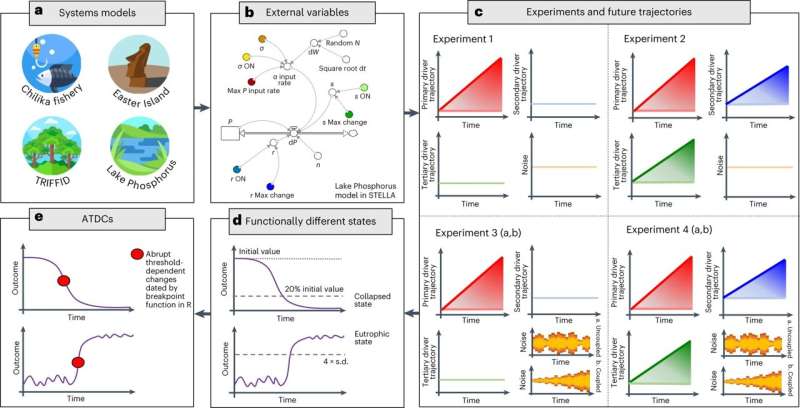This article has been reviewed according to Science X's editorial process and policies. Editors have highlighted the following attributes while ensuring the content's credibility:
fact-checked
peer-reviewed publication
trusted source
proofread
Ecological 'doom loops' edging closer, study warns

Extreme weather events such as wildfires and droughts will accelerate change in stressed systems leading to quicker tipping points of ecological decline, according to a new study.
Using computer modeling, the U.K. research team, which includes scientists from the University of Sheffield, looked at four ecosystems under threat to work out what factors might lead to tipping points, beyond which collapse was inevitable. In some systems, the combination of adding new extreme events on top of other ongoing stresses brought the timing of a predicted tipping point closer to the present by as much as 80%.
Ultimately, say the authors, a "perfect storm" of continuous stress from factors such as unsustainable land use, agricultural expansion and climate change, when coupled with disruptive episodes like floods and fires, will act in concert to rapidly imperil natural systems.
The team looked at two lake ecosystems and two forestry examples, including the historic collapse of the Easter Island (Rapa Nui) civilization, widely thought to have been the result of over-population combined with unsustainable exploitation of tree cover.
The models were run over 70,000 times for each ecosystem, with variables adjusted on each occasion. Up to 15% of collapses occurred as a result of new stresses or extreme events, even while the main stress was kept constant. In other words, even if ecosystems are managed more sustainably by keeping the main stress levels like deforestation constant, new stresses like global warming and extreme weather events could still bring forward a collapse.
"All four of the ecological systems we looked at showed the same overall outcomes," said co-author Dr. Gregory Cooper from the University of Sheffield's Institute for Sustainable Food.
"This has potentially profound implications for our perception of future ecological risks. While it is not currently possible to predict how climate-induced tipping points and the effects of local human actions on ecosystems will connect, our findings show the potential for each to reinforce the other. Any increasing pressure on ecosystems will be exceedingly detrimental and could have dangerous consequences."
The number of extreme climate events has increased since 1980 and global warming even at 1.5°C will increase those numbers further. Scientists are also concerned about possible knock-on effects as one collapsing ecosystem impacts on neighboring ecosystems.
"Over a fifth of ecosystems worldwide are in danger of collapsing," said Professor Simon Willcock from Rothamsted and Bangor University, who co-led the study published in Nature Sustainability.
"However, ongoing stresses and extreme events interact to accelerate rapid changes that may well be out of our control. Once these reach a tipping point, it's too late."
He added, "In the past two years, the world has come together around the climate and ecological crises through the UN Climate Change and Biodiversity Conferences. But we should remember that the causes of the crises are interlinked—that they have already collided—and that inaction over both may result in dire consequences."
An example is the UN's International Panel on Climate Change (IPCC) estimate for a tipping point in the Amazon Forest prior to 2100. The new study suggests a breakdown may occur several decades earlier than predicted by the IPCC. For example, it is well known that the Amazon Forest is threatened by deforestation. However, it is easy to imagine how global warming and extreme climate events such as droughts and wildfires add to this stress. This may decrease the Amazon's ability to generate its own rainfall, making it drier and more vulnerable—resulting in the ecosystem spiraling down in a doom-loop.
"Previous studies of ecological tipping points suggest significant social and economic costs from the second half of the 21st century onwards. Our findings suggest the potential for these costs to occur much sooner," added co-author Professor John Dearing, Emeritus Professor at the University of Southampton.
More information: Simon Willcock et al, Earlier collapse of Anthropocene ecosystems driven by multiple faster and noisier drivers, Nature Sustainability (2023). DOI: 10.1038/s41893-023-01157-x
Journal information: Nature Sustainability
Provided by University of Sheffield


















